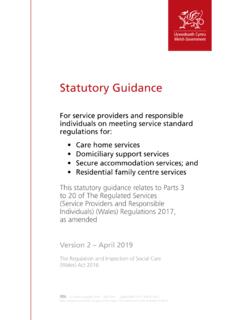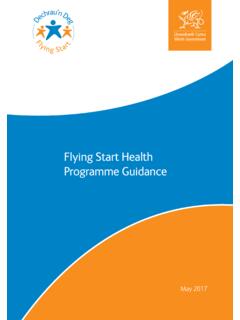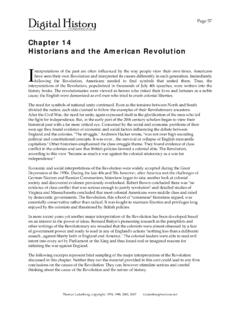Transcription of National Clinical Framework 8 - Welsh Government
1 National Clinical Framework :A Learning Health and Care SystemMae r ddogfen yma hefyd ar gael yn Gymraeg / This document is also available in Welsh . Crown copyright 2021 WG42184 Digital ISBN 978-1-80082-997-8 Welsh Government 2021 1 CONTENTS Minister s Foreword Chief Medical Officer s Executive Summary 1. Introduction 2. The Current Clinical Model 3. The Future Clinical Model Population Health Quality and Safety Pathways Prudent healthcare Outcomes 4. The Enablers Clinical Networks National Programmes Workforce Strategy Digital Strategy 5. Framework Summary and Implementation 2 FOREWORD The year 2020 was undoubtedly the most challenging the NHS in Wales has faced since its creation in 1948. The COVID-19 pandemic meant services had to adapt rapidly to reduce the risk of transmitting the disease and meet the needs of those who became seriously unwell from contracting the disease. At the same time, essential services had to be maintained and difficult decisions made about the provision of more routine services in order to cope with the demands caused by the pandemic.
2 In doing so, we witnessed the sheer determination of our workforce to continue to deliver care and do the best for the population and one another. Despite all the challenges, the pandemic also acted as a powerful stimulus to transform healthcare delivery. We saw examples of innovation delivered at scale and pace that was unprecedented. Notable examples include the roll out of digital platforms to support virtual consultations, the reorganisation of primary care services in clusters to provide COVID hot and cold sites, cross-sector partnership working that allowed the extremely clinically vulnerable to be supported in their homes, and the beginning of the biggest vaccination programme in the NHS s history. As the vaccination programme gives us hope of more normal times, our thoughts will begin to turn to the recovery of all Clinical services and the ongoing needs of our population. This will be a long and complex process, with a workforce that is tired and which also needs a chance to recover.
3 However, there is also an opportunity to come back stronger and we cannot afford to miss it. It is an opportunity to build an NHS that is able to address some of the long-standing challenges it faces and to ensure it can meet the needs of future generations. This National Clinical Framework sets out how we can begin to realise that ambition through the development of our Clinical services. It is a vital part of a much broader effort that was described in A Healthier Wales. This Framework is about how Clinical services in our NHS fit into that wider picture. Although the work to develop this Framework began before the pandemic, the experiences of the past year have helped us to see what it is possible to achieve with the right impetus, leadership and engagement. This is something for us all to build on and through this Framework I hope we can capture some of that spirit for the longer term. As a nation we have made a distinctive choice that planning, not the market, drives our healthcare system.
4 This Framework will build on that choice and puts planning for our population s needs above the organisational interest and beyond the constraints of their boundaries. It seeks to unleash the revolution from within that is needed to deliver prudent and value based healthcare. It recognises that greater central direction is needed to make that behaviour and philosophy a reality. The Framework sets out a health system that is co-ordinated nationally and delivered locally. One that is managed through collaborations, between health organisations and partners, by those directly responsible for their respective populations. This will ensure local ownership and a thriving innovation agenda. 3 This new way of organising and delivering care is more vital than ever. The pandemic has had a devastating effect on thousands of people and their families in Wales. It has also shone a light on the appalling impact that health inequality has on our population, particularly for vulnerable groups, deprived communities and Black, Asian and Ethnic Minority populations.
5 We have arrived at an important crossroads in our history and the decisions we take at this juncture will determine the health and wellbeing of current and future generations of the Welsh population. I am pleased to be able to endorse this Framework as a means of helping us all make the right decisions about how Clinical services should be delivered in the 21st century. Vaughan Gething Minister for Health and Social Services 4 EXECUTIVE SUMMARY I would like to offer my heartfelt thanks to the team that developed this important Framework . Particular thanks go to Dr Allan Wardhaugh, Dr Alastair Roeves and Sian Passey RN/RM who led the Clinical engagement to inform and shape the drafting of this Framework , as well as all those who participated in the extensive engagement to influence its development. It has been a significant challenge to write such a Framework in the context of the historic challenges facing the NHS, while the UK was in the midst having to cope with a destructive and destabilising pandemic.
6 I am confident that this Framework offers the NHS in Wales a sound basis for the modernisation and transformation of the Clinical services that will now emerge. It is of course part of a much broader set of actions that are set out in A Healthier Wales designed to move us to a fit for purpose and sustainable health and care system. How we design and deliver our NHS Clinical services is an absolutely fundamental aspect of how we can achieve that aim. The NHS has already changed significantly and has balanced the challenges of increased demand and cost, within the context of the constrained and finite resources that we see all publically funded health services struggle with. The reason it has been able to do this so far has largely been down to the dedication and hard work of its staff - staff in its broadest sense and not just our vital healthcare professionals. More significant change in the way we plan to deliver Clinical services will make things easier for our workforce trying to do their best, will make our service more resilient in meeting the needs of our population, and make it more responsive to the priorities set through our democratic processes.
7 A Healthier Wales called for the development of a National Clinical plan for specialist health services setting out our strategic approach to delivering safe and high quality health services which meet the needs of people across Wales . Therefore, I welcome this Framework and the opportunity to make this a reality for people working in our health system. In doing so, I recognise that our health and wellbeing are affected by wide ranging socio-economic impacts. So I am pleased this Framework is grounded in a life-course approach and that it requires NHS organisations to act upon areas of cross-cutting priority with partners, to maximise the contribution our healthcare system can make. It means the NHS will be able to make the most of its contribution to keeping people well in childhood and adolescence, throughout their education and employment, and supporting people to stay well and independent for as long as possible. This document acts as a Framework for the NHS s planning and delivery of Clinical services in the context of the strategic approaches set out by the Welsh Government .
8 This includes the approach to digital health services, NHS workforce development and the shift of focus to primary and community services. It encompasses outpatient reform, 5 improving disease outcomes and the challenges of unscheduled care. It brings these challenges and solutions together into a coherent vision for Clinical services. Early cross cutting opportunities have been identified in this Framework and I expect to see progress in these areas. I also look forward to seeing how other areas not specifically mentioned are being reviewed to utilise the principles set out in this Framework . It will ensure we are able to offer our patients better experiences and improved outcomes. If we have learnt anything over the last year, it is that our workforce is our greatest asset and good health and healthcare are our community s most valued commodities. This Framework looks to set the ambition for how these will be nurtured as NHS Wales sets out on the path to recovery and to a brighter future.
9 Dr Frank Atherton Chief Medical Officer for Wales 6 1. INTRODUCTION This National Clinical Framework sets out a coherent vision for the strategic and local development of NHS Clinical services. It is grounded in the life course approach to service delivery and aligned to the burden of disease facing the population. Its intent is to improve patient outcomes and support the planning and delivery of resilient Clinical services. It builds upon the findings of the Parliamentary Review and the direction set in A Healthier Wales and has benefited from looking at international experience and engagement with NHS colleagues. The Framework will sit at the centre of our system of planning. Background In 2015, the Organisation for Economic Cooperation and Development (OECD) reviewed the strengths and weaknesses of how Wales meets the health and wellbeing need of its population. It called for a stronger central guiding hand for the NHS.
10 This was followed by a Parliamentary Review of the Long Term Future of Health and Social Care, led by a former chief medical officer for Wales, Dr Ruth Hussey. It called for a revolution from within to drive the changes we need to see in our health system. The Welsh Government s response, A Healthier Wales, was published in June 2018 and among its actions was a National Clinical plan. The Clinical plan was intended to set out our strategic approach to delivering high quality healthcare services, which meet the needs of people across Wales. This was to include consideration of how specialist services and hospital-based services should be provided, and the skills and technologies needed to support them, as part of the broader health and social care offer. In recognition of the scale of the National challenge and the complexity of operationalising this locally, it was decided to develop a National Clinical Framework . This Framework attempts to set the parameters for a wider set of Clinical changes required through our National , regional and local NHS planning processes.












